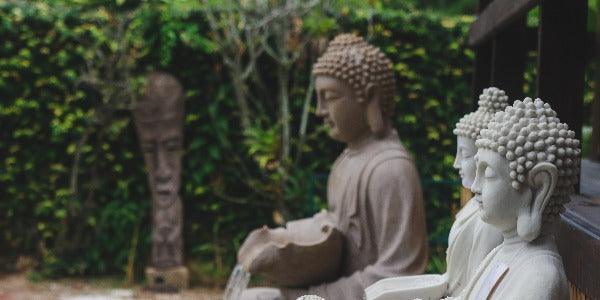The garden decor guided by the precepts of Zen art challenges the meaning we attribute to the decoration and landscaping of the external areas. Unlike the Zen garden we know, its conception of contemplation is not minimalist, but is also aimed at spiritual connection and deepening the understanding of Buddhist teachings - including other Eastern philosophies or Asian philosophies focused on the development of spirituality, such as Hinduism . In other words, the proposed zen garden is not restricted to aesthetics and the rock garden, but allows the tropicality of our gardens to meet the buddha nature that exists in everything that exists.
After all, if the purpose that guides the creation of the Japanese garden as a meditation practice is the understanding of oneself to recover one's original nature (of Buddha ), the Zen decoration will transform the external environment into a spiritual space like this niwa (garden). inspired by the practices of Zen Buddhism . Sculptures , fountains and vases according to the theme are in tune with the three main elements ishi (rock or stone), mizu (water) and shokobutsu (vegetation) that make the zen garden an essential environment to walk the peaceful middle path through relaxation .
Stone sculptures: zen art and garden decoration

The stone is as symbolic an element as the representation of the Hindu gods.
Most eastern philosophies use the practice of spirituality as a way of understanding the mechanisms of the mind and applying concepts in order to use the conquest of virtues to educate it. And that is how Zen Buddhism is dedicated, a spiritual philosophy with a peculiar mystical trait which Zen art is guided by. In this context, the practice of concepts with the use of this art in garden decoration makes the Buddhist teaching more accessible and regular, making it part of everyday life at the same time that it converts the home into an environment of peace.
When we broaden the concept of Zen art to include spiritual symbols from other Asian philosophies - also aimed at creating a peaceful space and stimulating the expansion of consciousness - such as the Hindu culture , we can explore in stone sculpture the essence of the ishi (stone) used in japanese gardens. She is one of the three fundamental elements in the construction of this space for contemplation and meditation. They materialize in the garden the idea of a mountain, which in turn symbolizes divine wisdom (buddhic) and the confidence that there is no insurmountable obstacle. In this same line, Ganesh conducts what he does best: removing obstacles so that prosperity prevails.
Decorative fountains: the relaxing sound of oriental art

Water and Zen art guide us towards the transformation of being based on contemplation.
Like stone arts , mizu (water) is another vital element. This powerful tool for meditation - especially when in motion - purifies, transmutes and mobilizes stagnant energy, converting it into positive energy , while the relaxing sound of running water from the waterfall leaves the environment calm, inspiring inner peace. That's why the water fountain is one of the most important oriental arts in garden decor based on traditional Feng Shui concepts.
In order to simplify the path of connection with spirituality , many Zen fountains are developed with decorative sculptures and incorporate the image of Buddha and Hindu gods such asDewi Sri , the goddess of prosperity and fertility. And as there is no fertile life without water, as a decorative source , Dewi not only enhances the intention of abundance, but also manifests in the garden the feminine energy that, like water, germinates everything it touches.
Garden vases: support for flowers and teachings

Buddha's iconography becomes a seed for the flowering of meditation practice.
You must be wondering why decorative vases support the basis of a zen decoration in the garden… And here the understanding is quite simple: the vases support the plants or vegetation ( shokubutsu) of a classic zen garden . This third essential element is based on the principle that each vegetation is defined and organized in the external environment according to the teaching, based on the principles of Zen , which it transmits with its nature . The practice of planting and placing plants in the garden helps to silence the mind and maintain engagement in spiritual development .
Buddhist symbols consonant with the Buddha's head are aligned with the invigorating purpose of the garden decor and sow the flowering of the practice of Buddhist Zen meditation as a tool to detach from materiality and return to the roots to understand the light and shadow of everything that exists in truth, without the masks of illusion, with the divine perspective and wisdom within. They make spiritual teachings part of everyday life, enriching it with higher purposes.

Vases, fountains and Zen sculptures transform the garden decor into a spiritual space.
The zen garden shows the importance of outdoor environments in creating balanced spaces - physically and energetically - to transform your home into a spiritual temple or empowering refuge. And in our online store you will find Zen arts that will show you the way to make that aspiration come true.
Namaste!
Milene Sousa - Art & Tune











2 comments
Visa
[url=http://www.gvs5p4j8s14104n55dkn54qyt0u2u2j0s.org/]uhwqyjxxjyw[/url]
ahwqyjxxjyw
hwqyjxxjyw http://www.gvs5p4j8s14104n55dkn54qyt0u2u2j0s.org/
Gostaria de saber como instala a bomba nessa fonte de buda.